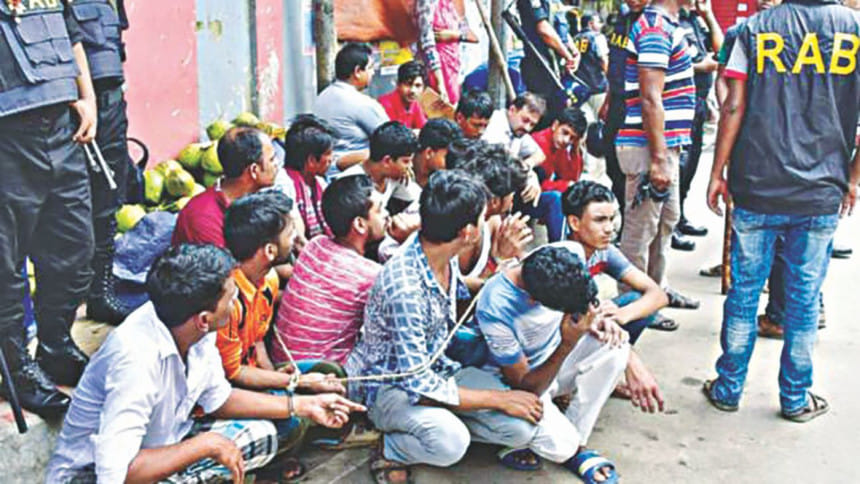“Anti-drug drive” threatens development

One of the most densely populated countries in the world, Bangladesh faces formidable challenges to eradicate poverty and provide sustainable development to its communities. Yet the country has been successful in the past decade in rising to these challenges. According to the World Bank, the country's economy grew in 2016 at just above 7 percent, the fastest in 30 years, with average incomes for the poorest 40 percent of households growing 0.5 percent faster than for the country as a whole between 2005 and 2010. Many health indicators, such as immunisation coverage, tuberculosis control, maternal and child mortality rates, and life expectancy have been improving steadily. And there have also been considerable gains in access to education.
What could imperil this promising trend towards poverty eradication and human development? Certainly the aggressive campaign initiated by the authorities against illegal drugs, primarily affecting consumers and low-level dealers, and characterised by a lack of due judicial process that has led to more than 130 extrajudicial deaths. This campaign is reminiscent of the on-going crackdown in the Philippines—and deeply concerning.
This notion of waging a "war on drugs" is foreign to Asian countries. It was a construct launched by the Nixon Administration in 1971—the same year Bangladesh suffered its horrendous war of independence—to reach the unrealistic target of a drug-free America. This has resulted in prison over-crowding and overdoses epidemics in the urban and rural poor US populations, and in unimaginable violence and militarisation of the security sector in Central and Latin America, which accounts for incalculable human lives.
So while we certainly acknowledge the deep concern with the presence of methamphetamine in Bangladesh, similar "anti-drug" tactics in the Philippines have provided no positive lasting results—and cost many thousands of lives. The violent repression initiated in Thailand in 2003, which also neighbours the precursor producing countries, failed so abjectly that the current government called for reform in 2016, and has now even moved towards the partial decriminalisation of use and possession.
Tragically, experiences elsewhere have shown that the people most affected by brutally repressive drug policies are the poor and vulnerable. The "anti-drug drive" therefore promises sadly not to reduce in any lasting way the presence of drugs and associated harms, but rather to undermine the relation between security forces and the most marginalised in society, and increase the level of insecurity and violence.
This further weakens the trust and relationship between the state and its representatives, with the population they are to serve. This is particularly true when among those targeted by the crackdown are many who have a substance use disorder, which requires support and care, or who have engaged at the low end of the drug trade due to a lack of economic options, for their own survival. When the poorest communities are affected, this undermines attempts to lift the country further out of poverty or to achieve national cohesion.
An effective drug policy is admittedly complex and there is no one-size-fits-all. Different countries have adopted different policies as required by the particular challenges they face. But there are some common approaches that evidence has shown to be effective, notably by focusing on health, safety and people's rights.
This implies providing a range of drug prevention and treatment options to the fullest extent that the health system in Bangladesh can support. In the meantime, authorities should rely on cost-effective harm reduction services, which play an instrumental part in curbing public health epidemics such as HIV or Hepatitis C. These services should remain easily accessible without fear of legal coercion, and should be protected by authorities to allow people who use drugs of attaining physical and mental health and becoming integrated members of society, thereby taking part in and benefiting the economic development of the country.
Effective drug policy also involves reforming the criminal justice system and prioritising law enforcement towards large-scale trafficking, the upper-levels of the illegal market and the corruption their huge benefits can fuel. It particularly requires that law-enforcement measures be guided by respect for human dignity specifically in relation with the most vulnerable and marginalised populations in communities and regions.
Not only are these measures far better aligned with Bangladesh's goal to end poverty, but they will also help address the root causes of drug use and trafficking, and therefore be far more effective on the longer term than the brutal approach which is currently favoured.
Ruth Dreifuss is former President of Switzerland and Chair of the Global Commission on Drug Policy. José Ramos-Horta is former President of Timor-Leste, Nobel Peace Prize laureate, and member of the Global Commission on Drug Policy.





Comments